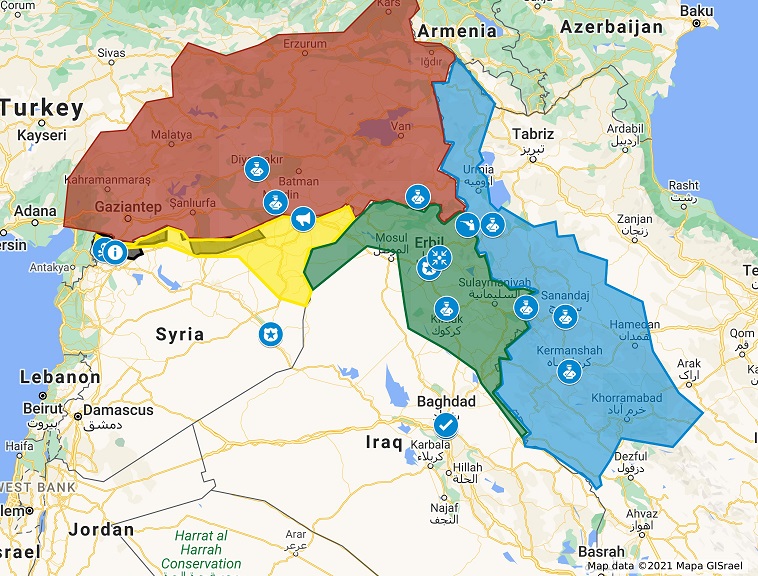1.3K
Iran
- The Turkish government is planning to deport an Iranian-Kurdish activist named Afshin Sohrabzadeh. Sohrabzadeh, who was sentenced to 25 years in prison by the Iranian regime, has launched a global appeal via social media to generate opposition to the Turkish government’s decision. That said, the Turkish government has returned several Kurds to Iran in recent years, including asylum seekers fleeing Iranian prosecution.
- Iranian authorities continued their ongoing crackdown on participants and organizers of Nerwoz celebrations in Iranian Kurdistan, especially those involved with gatherings featuring the banned flag of Kurdistan. Iranian intelligence officers (Ettela’at) in Marivan’s Ney village arrested a Kurdish man named Rebwar Parwaza on charges related to Newroz celebrations. Concurrently, Kermanshah’s Islamic Revolutionary Court sentenced a Kurdish activist named Jalal Namdari to eight years in prison for organizing and participating in anti-government protests in 2019. The same court sentenced another activist named Saed Khalidi to five years in prison for “anti-national security efforts” due to his alleged membership of Kurdish opposition parties. Lastly, two Kurdish activists named Rahim Rifatii and Rahman Tabish were sent to prison in Naqadeh to begin serving 43-month sentences for “membership in Kurdish opposition parties.”
- Iranian border guards wounded two Kurdish border porters near the Iran-Iraq border in the vicinity of Khanera town. One of the Kolbars, Hakim Osmani, suffered severe injuries and was transferred to a hospital in Erbil Governorate’s Soran District.
Iraq
- The Kurdistan Region Security Council released a video featuring the confessions of several ISIS (Da’esh) members who were planning to carry out IED attacks and assassinations in Erbil. The terrorists, who were arrested in February, were allegedly organized and directed by Da’esh operatives in Syria’s al Hawl refugee camp.
- The Secretary-General of the Arab League Ahmed Aboul Gheit traveled to Iraqi Kurdistan after his visit to Iraq and met with Kurdish officials to discuss the plethora of challenges facing Iraq, including terrorism and attempts to improve relations between Baghdad and Erbil. Meanwhile, the President of Kurdistan Region Nechirvan Barzani met with Iraqi leaders in Baghdad, including Prime Minister of Iraq Mustafa al Kadhimi. Barzani referred to Baghdad as the strategic partner of the Kurdistan Region and vowed both sides would work together to solve the many problems facing the nation. Relations between the Kurdistan Regional Government (KRG) and Government of Iraq (GOI) have improved since the passing of Iraq’s 2021 budget bill.
- The US-Iraq Strategic Dialogue ended last week and resulted in several agreements, including the GOI’s reaffirmation of its commitment to “protecting the Global Coalition to Defeat ISIS’s personnel, convoys, and diplomatic facilities.” At the same time, the US clarified its mission in Iraq will be focused on training, equipping, and assisting Iraqi security forces.
- Iraq’s Ministry of Interior began prosecuting 75 Kurdish police officers in Kirkuk for voting in favor of the 2017 Kurdistan Region independence referendum. Iraq’s Kurds responded by claiming the prosecutions are part of an ongoing GOI purge that has resulted in the replacement of hundreds of Kurdish officials and security officers in Kirkuk Governorate, including the Kurdish governor, with non-Kurds since October 16, 2017.
Syria
- Turkish-backed Islamist militias continued to commit war crimes against Afrin’s Kurdish residents last week, as at least a dozen Kurds were kidnapped by the Hamza Division. Turkish-backed militants have previously executed kidnapped civilians or released them after receiving ransom payments. Moreover, two children were killed by an IED allegedly emplaced by Turkish-backed groups.
- Pro-Kurdish social media accounts released videos of Russian forces withdrawing from the Kurdish-held town of Tal Rifa’at last week. The move stoked fears among northeastern Syria’s Kurdish population of an impending Russian-Turkish agreement that would facilitate additional Turkish incursions into Syria, as Russia and Turkey have previously reached agreements to allow Turkish forces to invade Afrin and parts of eastern Syria.
- The Syrian Democratic Forces (SDF) announced it carried out three joint operations with the US-led coalition in Qamishli, Hasakah, and Deir ez Zor and arrested three Da’esh terrorists, including a senior commander. Meanwhile, a member of the SDF-affiliated Manbij Military Council (MMC) was killed by an IED west of Deir ez Zor.
- The Kurdish-led Autonomous Administration of North and East of Syria (AANES) agreed to send more oil to the Syrian regime to alleviate the latter’s severe energy crisis that has led to the closing of its border crossings with the AANES. On another note, while the value of the Syrian Pound continues to plummet, the AANES increased the salaries of public employees in its administered territories by 30 percent.
Turkey
- A court in Mardin sentenced a Christian priest named Sefer Bileçen to two years in prison for “membership of a terrorist organization” after he allegedly provided food to members of the Kurdistan Workers’ Party (PKK). Bileçen denied the accusations and claimed his religious views dictate he provide food to all those in need, regardless of their identity. Concurrently, the Turkish police jailed 11 more Kurdish women activists in Diyarbakir (Amid) and have now detained 26 since the first week of April. Furthermore, Turkish authorities arrested seven Peoples’ Democratic Party (HDP) members in Van, Adana, Hakkâri, and Darsim, including the HDP head of Tunceli Province’s Pertek District.
- In light of the Turkish government’s ongoing efforts to close the HDP, the Grand National Assembly of Turkey is planning to suspend the parliamentary immunity of ten more HDP lawmakers, including former HDP co-chair Sezai Temelli. Meanwhile, current HDP co-chair Pervin Buldan said the party is ready for snap elections and seeking strategic alliances with those accepting “equal coexistence.”
- A number of people in Diyarbakir (Amed) protested the Turkish government’s ongoing imposition of isolation on Abdullah Ocalan and demanded he be allowed family visits. At the same time, Kurds in Europe protested Ocalan’s isolation, and a number of political prisoners in Turkey continued their hunger strikes aimed at drawing attention to the Turkish government’s abysmal treatment of political prisoners.

